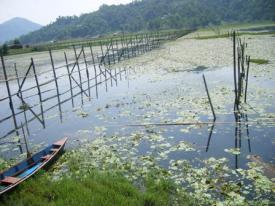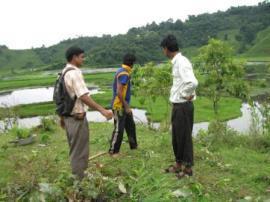Mohan Raj Kafle
Other projects
13 Jul 2011
Sustainable Lakes Conservation through Participatory Management of Invasive Water Hyacinth and Watershed Management in Pokhara Valley Lakes, Nepal
The project aims to make sustainable lakes’ conservation through research, education and awareness on wise use of invasive water hyacinth making compost, bio-pesticide and fish-feed with community involvement in Pokhara, Nepal.

Fish Farming by a Farmers’ group in Rupa Lake
Pokhara valley consists of nine lakes, with high biodiversity, which are used for irrigation, drinking water, fishery and eco-tourism. These lakes are plagued with multiple problems: water pollution, eutrophication, sedimentation, encroachment and invasion by water hyacinth. The Lakes are highly invaded with proliferation of invasive water hyacinth. As the lakes are major attraction for eco-tourism and many local residents depend for fishing, they are directly affected by this invasion. Annually large sum of money is spent to remove the water hyacinth but its recycling for wiser alternative use has not been carried out in Nepal yet. It is very difficult to get rid of the problem but the opportunity lies if we could use it for the benefit of farmers. On the other hand, farmers have to spent large sum of money to buy chemical fertilizers, pesticides and feed for the fish. Use of chemicals in agriculture lands of catchments is also promoting eutrophication. In this context, the project is designed for community-based experiment in making compost, bio-pesticide and feed for fish from invasive water hyacinth and transferring this technology to farmers.

On-site lake visit by the fellow with local youths
The project will inform local people about the social, ecological and economic impacts of invasion by Water Hyacinth so that they will gradually start to show their concern on minimization of chances to proliferation of this species in the lakes. They will gradually seek alternative options to best utilize the existing Water hyacinth by recycling it to make productive compost, bio-pesticide and feed for fish. Increased use of bio-pesticides, organic compost and regular removal of water hyacinth from the lake for its recycling will contribute to reduce pollution in the lakes. Economy of the farmers will be improved with healthy lake for boating and fishing along with the use of low cost agriculture inputs prepared from water hyacinth. It will form a good basis for participatory management of invasive species in wetlands for long term survival of Lakes and biodiversity.
This project will create long-lasting impact on management of invasive Water Hyacinth because it will empower local community through transfer of knowledge and technology by means of education, awareness and publications. It is expected that the local farmers will be able to formulate and implement awareness and Lake cleaning activities themselves within local institutional framework with minimum external support.